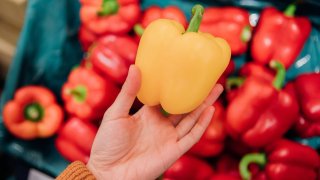
At the height of the pandemic, Americans across the country were wiping down their groceries with antibacterial wipes for protection from Covid-19. And it turns out, we now know that doing so may not have been completely pointless.
Actually, Covid-19 can live on the surfaces of certain groceries for an entire week, according to a new study conducted by the Food Standards Agency (FSA) in the U.K.
Researchers purposely deposited the virus on produce and packaging like vegetables, baked goods and canned drinks, to observe how long Covid could live on their surfaces.
The amount of virus placed on the grocery products was chosen based on an estimate of how much of the virus would likely land on the items through respiratory droplets, for instance, if someone sneezed or coughed near them.
Feeling out of the loop? We'll catch you up on the Chicago news you need to know. Sign up for the weekly Chicago Catch-Up newsletter here.
FSA concluded that the proportion of foods or food packaging with Covid-19 contamination on their surfaces "is extremely low, but not negligible."
Here are the foods that Covid lived on the longest and how you can be the most protected from the virus as you consume your groceries.
5 groceries that Covid-19 can live on for days
When tested at different temperatures and humidity levels, based on the usual storage methods for certain grocery products, Covid-19 was able to live on these five products for days:
- Broccoli: Up to five days
- Cheese: Several days to a week
- Chilled meat: Several days to a week
- Plastic surfaces, including plastic bottles: Three days to a week
- Refrigerated fresh peppers: Up to a week
Here's how to safely consume these grocery items
Money Report
Thankfully, the surfaces of most foods saw a major drop in levels of the virus within the first 24 hours, including apples, pastries and aluminum cans. So you don't need to do heavy-duty sanitizing.
Still, experts suggest standard grocery shopping procedures like washing fresh produce and thoroughly cleaning your hands before preparing and eating foods.
"The public may be interested in the finding that virus may persist in an infectious state, on foods and food packaging surfaces, for several days under certain common conditions," FSA wrote. "There is the possibility of transmission through contaminated food if the food is in direct contact with the mouth and mucus membranes."
Want to earn more and work less? Register for the free CNBC Make It: Your Money virtual event on Dec. 13 at 12 p.m. ET to learn from money masters how you can increase your earning power.
Sign up now: Get smarter about your money and career with our weekly newsletter






